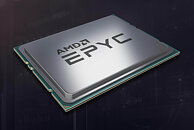Wednesday, April 29th 2020

AMD 2nd Gen EPYC Processors Set to Power Oracle Cloud Infrastructure Compute E3 Platform
Today, AMD announced that 2nd Gen AMD EPYC processors are powering the Oracle Cloud Infrastructure Compute E3 platform, bringing a new level of high-performance computing to Oracle Cloud. Using the AMD EPYC 7742 processor, the Oracle Cloud "E3 standard" and the bare metal compute instances are available today and leverage key features of the Gen AMD EPYC processors including class-leading memory bandwidth and the highest core count for an x86 data center processor. These features enable the Oracle Cloud E3 platform to be well suited for both general purpose and high bandwidth workloads such as big data analytics, memory intense workloads and Oracle business applications.Almost two years ago, we embarked on a very successful collaboration with AMD that brought industry leading performance to numerous enterprise customers running general purpose workloads on Oracle Cloud Infrastructure," said Vinay Kumar, vice president, product management, Oracle Cloud Infrastructure. "Today, we are launching our new Oracle Cloud E3 platform built on AMD EPYC processors. Customers will have access to virtual machines that support higher core counts, increased memory bandwidth, and the highest core count for any bare metal instance on any public cloud to run any workload."
"Oracle Cloud has been a key partner for AMD starting with our first generation EPYC products, and we are pleased to continue this strategic collaboration today with our 2nd Gen AMD EPYC processors powering the first Oracle Cloud family of E3 instances," said Forrest Norrod, senior vice president and general manager, Data Center and Embedded Solutions Group, AMD. "The high core count and memory bandwidth delivered by 2nd Gen AMD EPYC enables our customers, like Oracle Cloud, to provide their end users with exceptional performance and throughput for critical workloads in the cloud."
Enabling High Performance Cloud Computing at Oracle
Powered by the AMD EPYC 7742 processor, the Oracle Cloud E3 Platform enables customers to run high performance computing (HPC) workloads such as risk simulations, molecular modeling, and contextual search.
By using the AMD EPYC 7742 processor, Oracle Cloud E3 platform can deliver even more computing performance capabilities to their growing cloud customer base, including:
Learn more about the Oracle E3 instance on the Oracle blog here.
Source:
AMD
"Oracle Cloud has been a key partner for AMD starting with our first generation EPYC products, and we are pleased to continue this strategic collaboration today with our 2nd Gen AMD EPYC processors powering the first Oracle Cloud family of E3 instances," said Forrest Norrod, senior vice president and general manager, Data Center and Embedded Solutions Group, AMD. "The high core count and memory bandwidth delivered by 2nd Gen AMD EPYC enables our customers, like Oracle Cloud, to provide their end users with exceptional performance and throughput for critical workloads in the cloud."
Enabling High Performance Cloud Computing at Oracle
Powered by the AMD EPYC 7742 processor, the Oracle Cloud E3 Platform enables customers to run high performance computing (HPC) workloads such as risk simulations, molecular modeling, and contextual search.
By using the AMD EPYC 7742 processor, Oracle Cloud E3 platform can deliver even more computing performance capabilities to their growing cloud customer base, including:
- The ability to launch higher core count VMs, which now includes VMs up to 64 cores, each including simultaneous multithreading, and bare metal instances up to 128 cores.
- A higher memory-to-core ratio for memory-intensive workloads. With the high bandwidth capabilities of the AMD EPYC 7742 processor, E3 platform customers get 16 GB of memory per core - double the ratio of the current AMD EPYC processor E2 platform.
Learn more about the Oracle E3 instance on the Oracle blog here.


Comments on AMD 2nd Gen EPYC Processors Set to Power Oracle Cloud Infrastructure Compute E3 Platform
There are no comments yet.